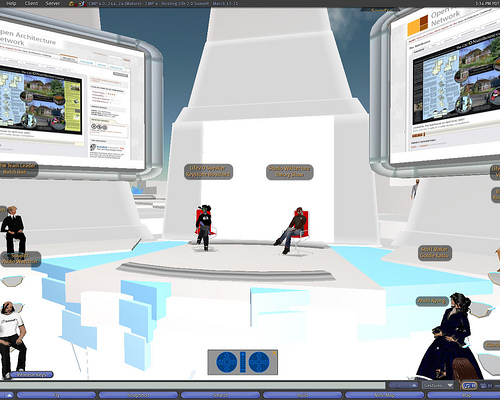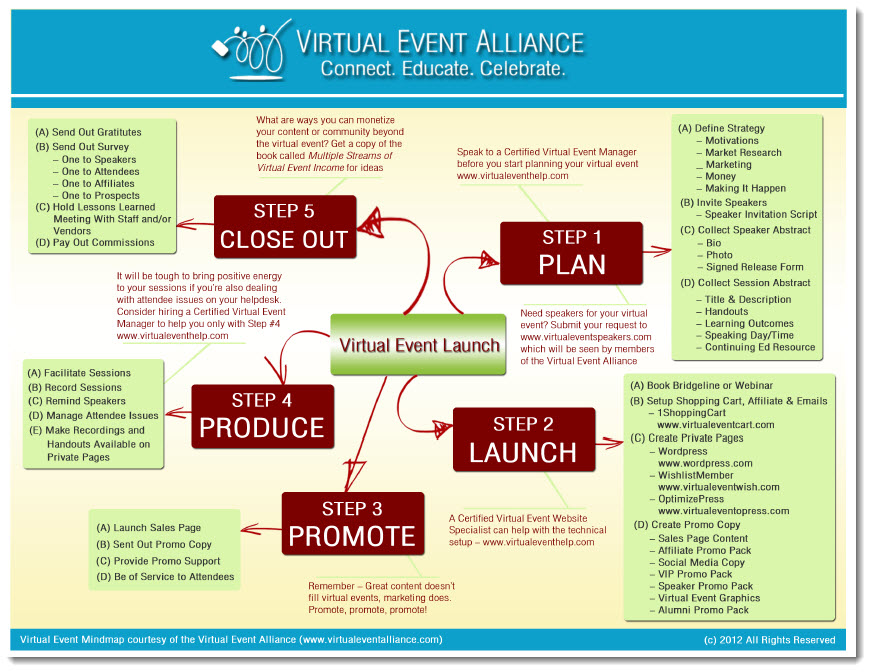I’ve managed my own virtual events and participated in a few as a speaker.
I know first hand what can happen if virtual event hosts don’t have a speaker release form in place so they can protect themselves, the speaker they’re working with and the content that’s being co-developed.
I have many horror stories, for example:
- There’s a virtual event host who took my recording (along with the other speakers) and allows others to resell it in their membership website. I didn’t mind that the virtual event host was selling my recording, but I didn’t give permission for it to be resold by others.
- Another virtual event host suddenly starting giving away the speaker recordings for free even though
 she charged for access just 2-months earlier. Needless to say, I wasn’t happy since I developed a unique topic for her paying audience.
she charged for access just 2-months earlier. Needless to say, I wasn’t happy since I developed a unique topic for her paying audience. - Yet another virtual event host required me to give 3-hours of my time in pre-interviews, prep sessions and panel discussions, in addition to my 90-minute session. As you can imagine, I wasn’t happy about this.
Seems like I’m not alone in my frustration with virtual event hosts.
I asked some of my friends, top experts in their fields, about their virtual event horror stories and they didn’t hold back. Over 25 of my colleagues shared their virtual event tales experienced at the hands of unethical and/or inexperienced virtual event hosts.
In most cases, a simple Speaker Release Form would’ve solved the problem. Not having your speakers sign a Speaker Release Form can damage your reputation. You may not know it, but people talk and if you have a reputation for treating speakers badly, you’ll soon find it difficult for anyone to say “Yes” speaking at your next virtual event.
A Speaker Release Form should:
- Remind the speaker which virtual event they’re speaking at
- Tell the speaker how you plan to use the recording in the future.
- Let the speaker know if you’ll be sharing a complimentary copy of the recording and/or transcripts.
- Whether or not you plan to share future proceeds from the sale of the finished product with the speaker.
Your Speaker Release Form doesn’t have to be long. All the content should fit nicely on just one page. However, the main goal of the Speaker Release Form is to let the speaker know how you plan to use her content.
If you’re looking for a Speaker Release Form, do NOT download one online. I even include a sample in the Virtual Event Marketing Blueprint, but I advice my students to seek legal council. Get a lawyer to craft one up for you. It’s better to spend the money getting a really good one crafted for your business than to get into trouble in the long run.
photo courtesy world2worlds


Leesa…
Great topic! While the industry calls it a “release” form, I wanted to share that what you’re talking about is, I suspect, not a release at all, but a permission form.
A release isn’t used to get permission–it’s used to get someone to relinquish rights to claims.
If what you want is a speaker’s permission to allow you to use her content in specific ways, then a release is absolutely the wrong tool.
One grants permission using a license (limited or otherwise).
I might be happy, for instance, to grant someone a license to use my voice and words and content, but not to release any claims that may arise out of any possible misuse of my voice and words and content.
I’m given release forms all the time, and I can’t sign them because I refuse to give away my rights. However, I am always happy to give permission for use of things I do/create. I find that most people simply don’t know there’s a difference.
Leesa, thanks for this informative and relevant piece–it should be of great value to your audience and help them avoid a pitfall that can have a negative impact on their brands.
As you know, I was a speaker at your virtual event in January, 2009 (social Media Telesummit). And, of course, you had the release forms and the guidelines thoroughly prepared and reviewed and signed by the speakers by the deadlines [as a former law school student on intellectual property, trademarks, copyrights and patents– you get an “A” in the procedural law- :)].
However, one thing that I found of value (and it is really only common professional courtesy) is to call the owner of the event or the co-owner of the copyright for the media (i.e., “intellectual property”) and let that individual or group know what it is you would like to do with the recording and obtain approval.
When I wished to share my recording of the event for a specific (but limited in time) virtual event, I immediately spoke to Leesa to confirm my ability to do so under the release agreement.
However, knowing that this was premium content, I treated it with the utmost care. I made it available ONLY from my site and only for 2 days (which was the time I agreed to allow others to listen to it). And, of course, the proper ATTRIBUTIONS were done in ALL mentions and publications about the topic or the event. Thus, it ended up serving as a good exposure for Leesa’s event and the value it brought to the listeners. After the 2 days, I removed the link permanently, and I removed the media file from my site so that it could not be accessible any more in any way.
By getting the agreement on the release rights for BOTH parties, and by doing the due diligence for ATTRIBUTIONS and caring for the intellectual property with the attention of an agent with a fiduciary duty, I knew that the situation ended up as a win-win for both myself and Leesa.
Did this require a lot of work, effort, tasks and follow-up?
ABSOLUTELY.
This is not something that will be “easy” (meaning that it can be done in 2 minutes or less without follow-up or worry).
But, if the objective you have is to provide value to your audience, promote your brand, and also in turn co-promote your virtual event hostess (Leesa, in this case), then you must have the mindset of a fiduciary agent seeking to protect the intellectual property that is premium content belonging to both yourself and your virtual event host.
My advice on this process: use it VERY SPARINGLY, and only if you have clear objectives on what you want to accomplish by including the recording in a repurposing event–while still adhering to the guidelines in the release agreement and doing what is in the best interests of both yourself and the virtual event group. My guess is that the 80/20 rule will apply: only 20 per cent of time will you really find it acceptable to repurpose, and to do all the work items leading to a successful delivery–but, if done correctly, this due diligence will render 80 per cent of the returns and payoff for you and your brand.
Leesa, thank you for being so available and agreeable when this happened. This was truly an instance of TEAMWORK, not insistence–and, as usual, your recommendations were greatly appreciated (I did follow a couple of them, and I am glad I did).
Hi Leesa,
This is a really good piece, and something I have to admit I didn’t think of myself. I was honored to deliver the closing session at the Self-Publishers Online Conference in May, and the conference organizers were fortunately very ethical and clear in what my obligations were, and their intentions regarding the content I shared. However, other than e-mails, we didn’t have a specific speaker’s release like you described.
When I do partnering or joint ventures, I always insist on a clear, written agreement, but now I will ensure I do the same with speaking engagements as well (whether someone else’s or mine).
Thanks for sharing this!
Melanie Jordan
Author Of “What You Know Is Worth More Than You Know(TM)”